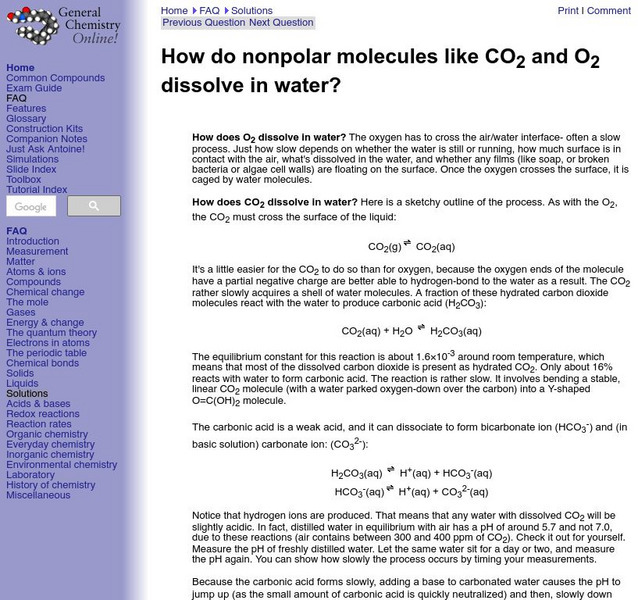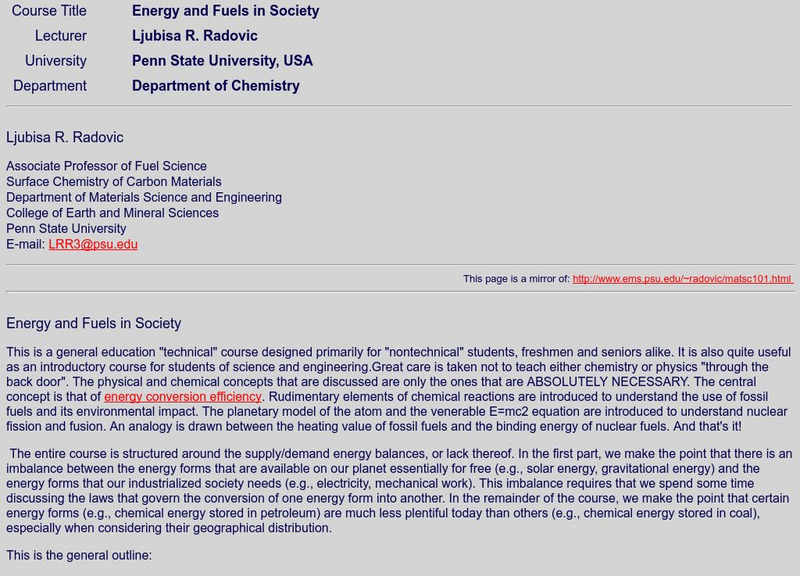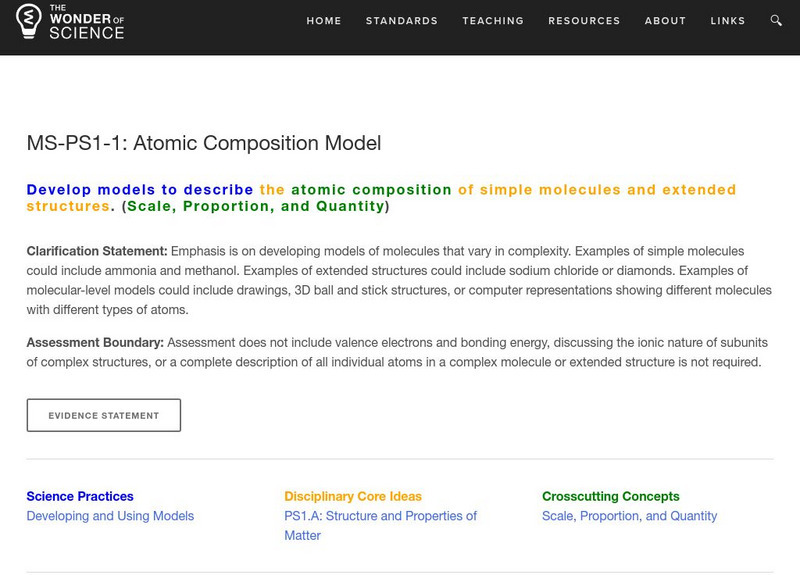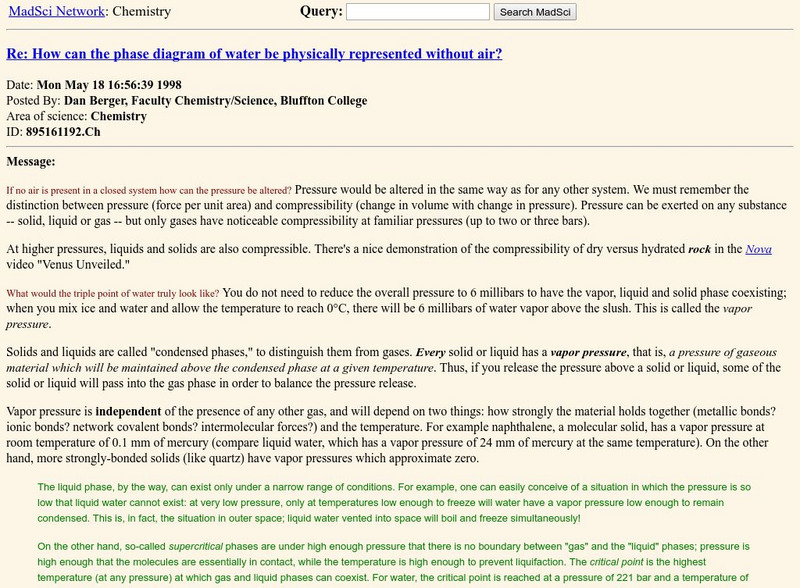Other
Exxon Mobil
Information about service station locations and information on the varios products they sell. Also includes news, job and career information, investor information, and more.
Concord Consortium
Concord Consortium: Molecular Workbench Showcase: Chemistry, States of Matter
See how gas, liquid, and solid molecules react to external pressure in this simulation. Also see a model of intermolecular motion through elliptical particles.
Physics Aviary
Physics Aviary: Heat Transfer Lab
This lab is designed to have students examine the different factors that affect the rate of heat transfer through a barrier between two gases.
Physics Aviary
Physics Aviary: Thermal Speed Lab
This lab is designed to have students learn the factors affecting the RMS velocity for a sample of gas. The student will be able to set the temperature of the environment and the mass of the particles.
US Geological Survey
Usgs: Energy Resources Program
Find the latest research and publications on the subject of energy, in particular: oil, gas and coal resources.
Frostburg State University
University of Frostburg: How Nonpolar Molecules Dissolve
This site from the University of Frostburg provides an explanation of the process by which nonpolar molecules dissolve in water.
Frostburg State University
Frostburg State Chemistry Online: Water Bond Angles & Phase Changes
Describes the bond angle of the water molecule during the transition from liquid to gas state. Also provides several examples and explanations for responses and answers given.
Other
Penn State University: Energy and Fuels in Society
This site, which is provided for by the Penn State University, gives twenty one chapters of charts, graphs, and information on synthetic fuels.
Incorporated Research Institutions for Seismology
Iris: Can Humans Cause Earthquakes?
A class investigation studying whether or not human factors can cause earthquakes through hydraulic fracturing.
ArtsNow
Arts Now Learning: States of Matter [Pdf]
In this instructional activity, students will move and generate choreography to understand different states of matter.
Other
King's Centre for Visualization in Science: Scientific Models
A series of interactive applets use scientific models to teach some basic concepts of matter, including states of matter and physical and chemical changes.
American Chemical Society
Middle School Chemistry: Changing State: Evaporation
Learn how substances change from a liquid to a gaseous state in the process of evaporation.
The Wonder of Science
The Wonder of Science: Ms Ps1 1: Atomic Composition Model
A collection of lesson plans for helping students understand atomic composition. Site uses work samples, phenomena, assessment templates, and videos to plan lessons to describe the atomic composition of simple molecules.
Ohio State University
Ohio State University: Properties of Gases
A good introduction to gas properties. Covers general properties and the four variables.
Chem Tutor
Chemtutor: Heating Curve Problems
Nice set of problems dealing with the concept of a heating curve. Students can click on the question and get immediate feedback on their answer.
BBC
Bb Ci Schools: Revisewise Science: Solids, Liquids, Gases
This site contains an interactive activity in which students can learn about the three states of matter. There is also a factsheet that lists numerous properties of liquids, solids, and gases. The factsheet also uses water as an example...
CK-12 Foundation
Ck 12: Chemistry Simulation: States of Matter
[Free Registration/Login Required] Compare three states of matter: solid, liquid, and gas.
CK-12 Foundation
Ck 12: Chemistry Simulation: Speedy Smells
[Free Registration/Login Required] Explore how the mass of a molecule affects how quickly a smell will reach our noses.
Texas Education Agency
Texas Gateway: Heating and Cooling
A tutorial reviewing the states of matter and the effects of heating and cooling matter in the different states. (Note: some of the links may not load in the archived version of the site.)
PBS
Pbs Learning Media: The Ruff Ruffman Show: Teacher's Guide: Kitchen Chemistry
Learn about kitchen chemistry alongside Ruff Ruffman. Students can use the videos, games, and activities from The Ruff Ruffman Show to discover how by investigating solids and liquids and exploring heating and cooling, science can help...
ABCya
Ab Cya: Hydro Logic
Hydro Logic is a splashy puzzle game that teaches the Water Cycle, also known as the Hydrologic Cycle! Navigate our wet little friend Enki to the goal in each level. Enki is liquid at room temperature, but can transform into gas and...
Khan Academy
Khan Academy: What Is the Maxwell Boltzmann Distribution?
In a gas, there are lots of molecules traveling at lots of different speeds. Here's a framework for thinking about that.
Concord Consortium
Concord Consortium What Are All Materials Made Of?
Activity 3 of this module explores: Is the particle model always better? Models are considered most useful when a variety of observations can be explained. A model of matter should explain observations of all types of matter. In this...
MadSci Network
The Mad Scientist Network: Chemistry
The question: "What would the triple point of water truly look like?" is discussed and explained. The phases of matter are described.













